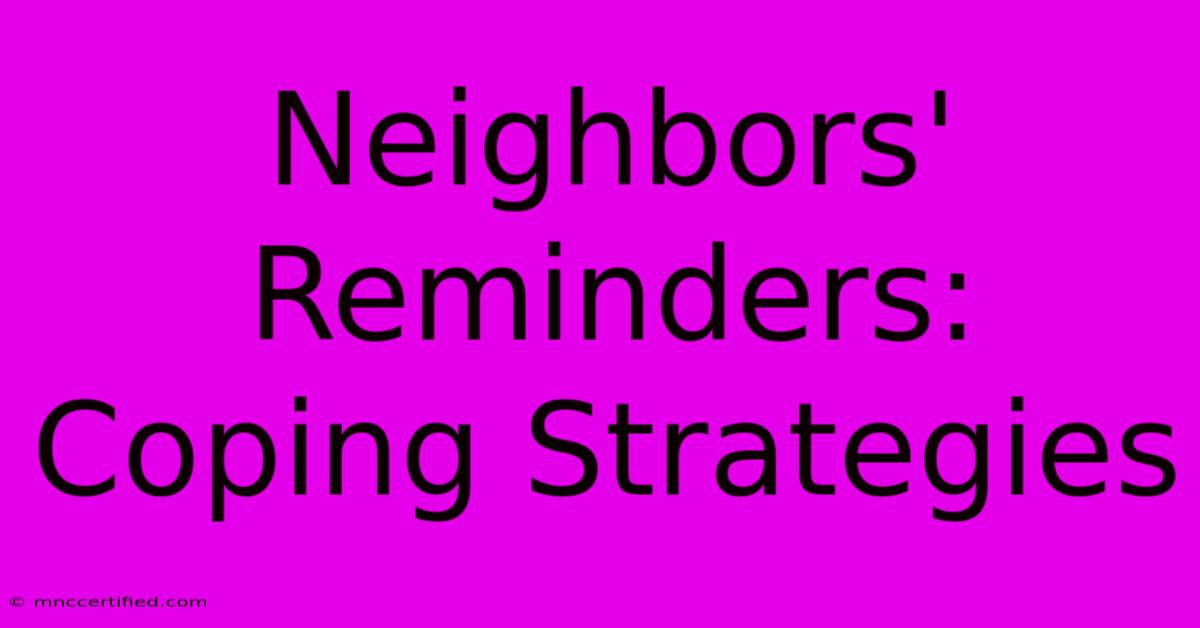Neighbors' Reminders: Coping Strategies

Table of Contents
Neighbors' Reminders: Coping Strategies for a Peaceful Coexistence
Dealing with inconsiderate neighbors can be incredibly frustrating. Whether it's loud parties, overflowing trash cans, or persistent barking dogs, these recurring issues can significantly impact your quality of life and mental well-being. This article explores effective coping strategies to navigate these challenging situations and foster a more peaceful coexistence with your neighbors.
Understanding the Root of the Problem
Before diving into solutions, it's crucial to understand the source of the conflict. Is it a simple misunderstanding, a recurring pattern of inconsiderate behavior, or something more complex? Identifying the root cause will inform your approach and help you choose the most effective strategy.
Common Neighborly Conflicts:
- Noise disturbances: Loud music, parties, construction noise, barking dogs.
- Property maintenance: Unkempt yards, overflowing trash, vehicle maintenance in the driveway.
- Parking issues: Blocking driveways, parking in designated spaces, inconsiderate parking.
- Disputes over shared resources: Fences, trees, property lines.
- Pet-related issues: Barking dogs, unleashed pets, pet waste.
Effective Coping Strategies:
1. Direct and Calm Communication:
This is often the most effective first step. Approach your neighbor in a calm and respectful manner. Explain how their actions are affecting you, focusing on the impact rather than placing blame. Choose a neutral time and location for the conversation. For example, "I've noticed a lot of noise late at night recently, and it's been difficult to sleep. Is there anything we can work out together?"
2. Mediation and Compromise:
If direct communication fails, consider involving a neutral third party, such as a mediator or a trusted mutual friend. A mediator can help facilitate a constructive conversation and find a mutually acceptable solution. Be prepared to compromise to reach a peaceful resolution.
3. Documentation:
Keep detailed records of every incident, including dates, times, and descriptions of the disruptive behavior. Include photos or videos as evidence if possible. This documentation is essential if you need to escalate the issue to your landlord or homeowners association (HOA).
4. Utilizing Your HOA or Landlord:
If direct communication and mediation fail, contact your homeowner's association or landlord. They have established procedures for dealing with neighbor disputes and can enforce community rules or lease agreements. Provide them with the documentation you've compiled.
5. Seeking Legal Advice:
In extreme cases where other strategies fail, seeking legal advice is an option. A lawyer can advise you on your legal rights and options for pursuing legal action. This should be a last resort after exhausting all other avenues.
6. Managing Your Own Response:
While addressing the problem is crucial, managing your own emotional response is equally important. Practice stress-reduction techniques like mindfulness, meditation, or exercise. Don't let the situation consume you. Maintain your composure, and prioritize your well-being.
Preventative Measures:
- Establish boundaries early: Introduce yourself to your neighbors and set clear expectations for respectful behavior.
- Be a good neighbor: Practice considerate behavior yourself to set a positive example.
- Communicate proactively: Address small issues before they escalate into larger conflicts.
Conclusion:
Dealing with difficult neighbors requires patience, communication, and a willingness to find solutions. By utilizing these coping strategies, you can significantly improve your chances of achieving a peaceful and harmonious living environment. Remember to prioritize your own well-being throughout the process. Seeking support from friends, family, or a therapist can also be beneficial when dealing with prolonged stress related to neighborly conflicts.

Thank you for visiting our website wich cover about Neighbors' Reminders: Coping Strategies. We hope the information provided has been useful to you. Feel free to contact us if you have any questions or need further assistance. See you next time and dont miss to bookmark.
Featured Posts
-
Little Buzz For Mc Gregors Logan Paul Bout
Dec 18, 2024
-
Mudryk Fails Drug Test Chelsea Statement
Dec 18, 2024
-
Juventus Vs Cagliari Coppa Italia Thread
Dec 18, 2024
-
Scotland Weather Warning Yellow Wind Alert
Dec 18, 2024
-
Barton Faces Charges Social Media Posts
Dec 18, 2024